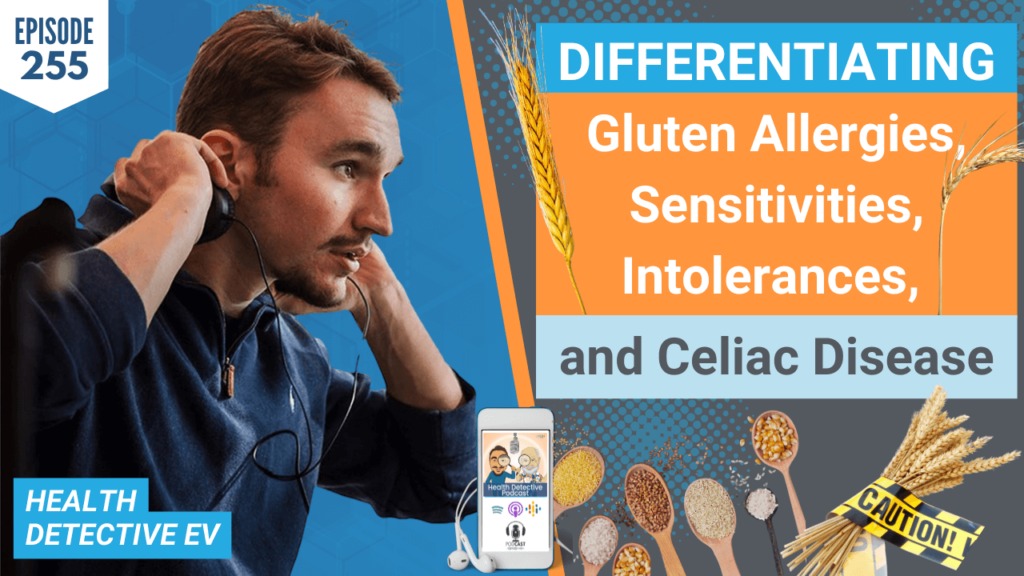Introduction
[00:00:00] Detective Ev: Well, hello my friends. Welcome back to another episode of the Health Detective Podcast by Functional Diagnostic Nutrition. My name is Evan Transue, aka, Detective Ev. I will be your host for today’s show on differentiating gluten issues.
We are actually revisiting a topic today. Admittedly, I’ve done this almost exact episode before on the show, except it was all the way back earlier than episode 100. I am sure I have learned a thing or two since then, at least, God, I hope so. The reason I’m bringing it up again, because I normally wouldn’t do this if you’re a regular listener, you already know that. But the reason I wanted to do this this time is because I cannot believe how often, even in the functional space, this stuff cannot be defined properly and differentiated properly.
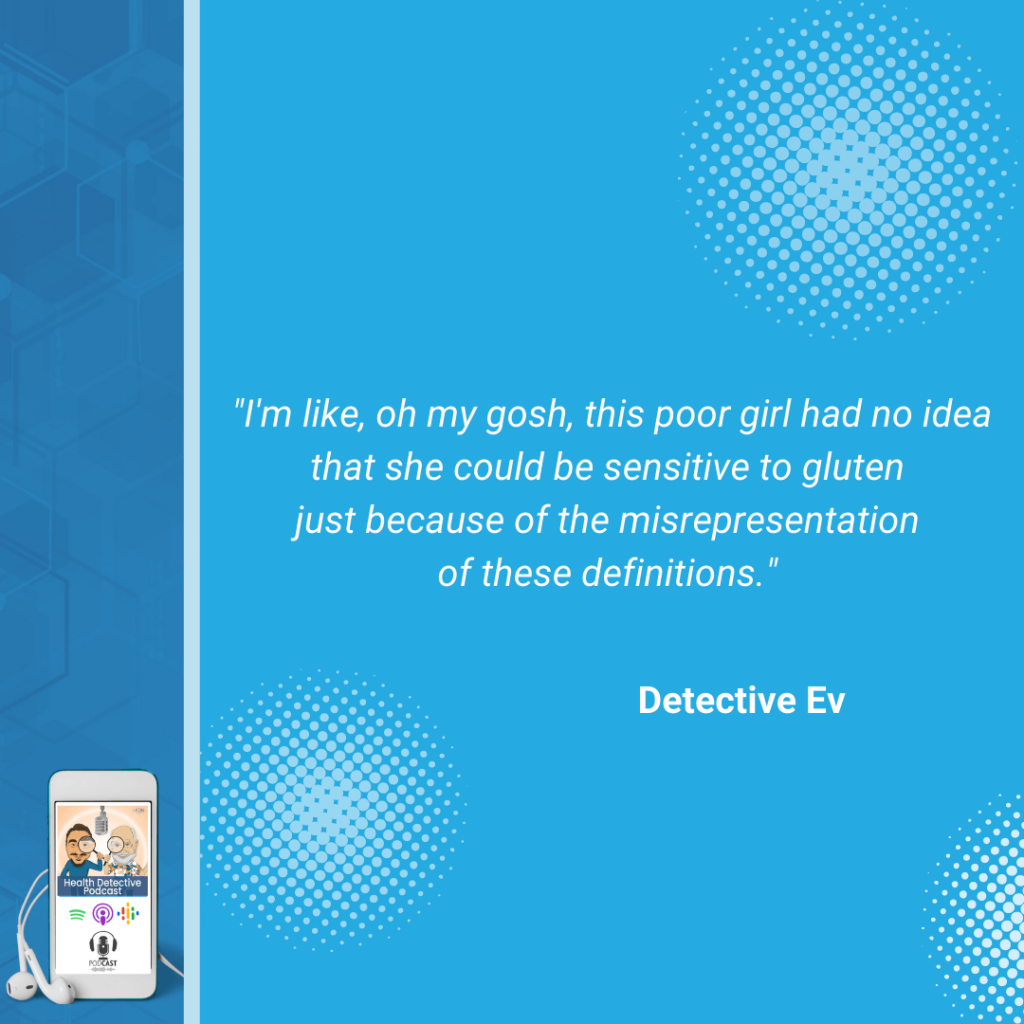
In addition, we really need to let our clients know some of this stuff. So, if you get nothing else from today, it’s a message for your clients. Because I was talking to a prospect for our business earlier this week, and it just triggered me. I’m like, oh my gosh, this poor girl had no idea that she could be sensitive to gluten just because of the misrepresentation of these definitions.
So, we’re going to break this down as the title implies. We’re going to be discussing the differences between gluten allergies, gluten sensitivities, celiac disease, and gluten intolerances. And at least for the sake of allergies, sensitivities and intolerances, you can take the word gluten out and put in any food, your favorite food.
Differentiating Gluten Issues: Food Allergies
Well, hopefully not your favorite food, because we’re talking about ways that you’d react to it. So, that wouldn’t be a good idea. How about your least favorite food? You can plug it in before this allergy thing, or the sensitivity thing, or the intolerance thing. This would remain true for all of it. The only thing unique here to gluten is going to be celiac disease.

Okay. With that said, let’s get going. So, the first one we want to discuss is a food allergy. What is a food allergy, what does that mean? How is it defined? When we’re talking about food allergies, that is something where your body is releasing a specific type of antibody to the food protein. It’s called IgE, otherwise known as immunoglobulin E. That’s what an allergy is.
Now, just because you have an IgE response doesn’t necessarily mean that it’s going to be the most severe reaction in the world. However, all of the most severe reactions are definitely allergies. The people that end up in the hospital because their throat’s closing up, the people that have anaphylaxis, the people that break out in extreme hives are almost always going to be people that have allergies, IgE antibody responses.
Also, interestingly is IgE has only been found in mammals. So, there is a useless fact for the most part, that you can now take with you after this podcast. IgE only found in mammals. Who the heck knew? This would be a really important thing to know, wouldn’t it?
Differentiating Gluten Issues: Ruling it Out
And here’s the good news. If you’re listening to something like this, you’re old enough to listen and actually comprehending what I’m saying, chances are you’d be pretty aware if you had any specific food allergies at this point. With that said, though, I think this is really a useful thing to test for. You can get this covered by insurance. They will cover a lot of the times the tests done by an allergist.

I say, get it done, rule it out. Make sure you’re not having an IgE reaction to anything because those are wreaking havoc on the body. Get it ruled out, and it’s probably going to be covered by insurance. So, that’s the allergy side. And again, this is something that most people would probably be aware of. These other things are where it can get a bit trickier.
Differentiating Gluten Issues: Food Sensitivities
Next, we’re going to move to food sensitivities. Food sensitivities are basically any immune response that’s not IgE. It’s a very broad term to say, sensitivities, when speaking about food, it covers a lot of stuff. Perhaps there should be more specific language used in the future, but as of right now, that’s kind of a broad blanket term for any immune response that is not an allergy.
Originally, the main way food sensitivity tests were done is by looking at an antibody called IgG. So, if you know IgE now is immunoglobulin E, then you probably can guess that IgG is immunoglobulin G. If you guessed that, congratulations, you would be correct.
When we have reactions and this antibody is involved, it’s really something that is not usually quite as severe. It’s almost never as severe as an allergy. You’re probably not going to get anaphylaxis or anything like that from IgG. It could actually be very mild, sometimes to the point that the person experiencing it might not even notice that they’re having a reaction.
Now, one side of that could be because it’s such a mild reaction, but the other side is a little tricky. The other side of this is they might not notice it because IgG reactions can be very delayed. So weird how the body works sometimes. It’s very cool, but it’s very weird at the same time.
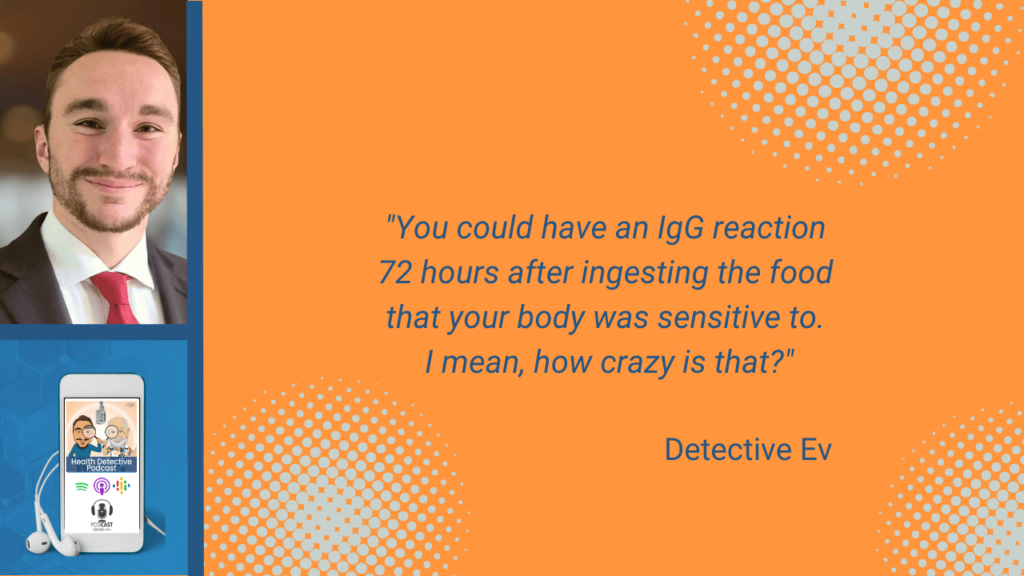
You could have an IgG reaction 72 hours after ingesting the food that your body was sensitive to. I mean, how crazy is that? That means you could have a tomato on a Monday, get a headache on a Thursday, and it was because of that tomato you ate on the Monday.
Differentiating Gluten Issues: Testing Is Extremely Useful
Even if you are the most disciplined meal planned individual, how on earth would you ever know that those two things were connected? And certainly, it would take an incredible amount of discipline and time to actually go do this in a regimen way, because just because it happened one time doesn’t mean it’s going to happen every time, right? You’d have to actually test this over and over and over again.
You can already kind of see when we’re talking about food sensitivities, why the testing side is extremely useful. I think it’s an intuitive thing to do with allergies as well. It just makes sense that you’d want to know about that. But, again, you might have gotten forced into that because a lot of people are aware that they have allergies because of the reactions that they have.

IgG and a lot of these other ways that the body can react immunologically, they’re not things to mess with either, but they’re more subtle. This is why you’ve got to do the testing. It doesn’t have to be through us. It can be through a million different places out there. Here’s the thing though. Again, sensitivities are a broad blanket term for pretty much any way that the body can react from an immune perspective with the exception of allergies.
Differentiating Gluten Issues: The MRT Test
There is a really interesting company, it’s something that we teach in the main FDN course. It’s available for USA practitioners and our Canadian practitioners as well. It is called the MRT test. Well, technically it’s mediator release test, so MRT by Oxford Biomedical Laboratories.
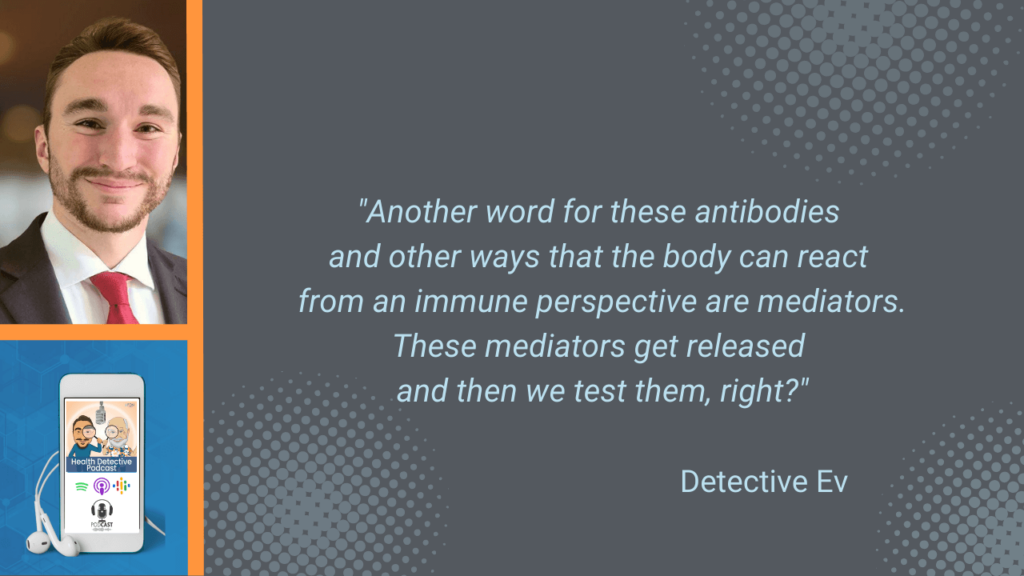
And what that stands for is mediator release test. Another word for these antibodies and other ways that the body can react from an immune perspective are mediators. These mediators get released and then we test them, right? Mediator release test.
And what this company, Oxford Biomedical Laboratories, did is they said, wait a second, wait a second. There are like hundreds, if not thousands of ways that the body can react that’s not an allergy. This is going to be crazy expensive. If we’ve got to invent something that’s going to test every little single individual one, it just doesn’t make sense.
What if we had a technology that could test for these things in a non-specific fashion, technology that could test for these things by not looking at any one thing specifically, but by looking at everything non-specifically. I sound like an FDN right now because this is exactly how we talk about all of our testing at FDN. It’s one of the reasons we really like the mediator release test. Now, grant you, I’m kind of playing with the words because what it means for their test is not necessarily the same thing as what it means for our philosophy. But humor me with this cause it sounds good.
Differentiating Gluten Issues: Measuring Volumetric Changes
The mediator release test, what it does is it has a patented technology behind it that allows this company to measure volumetric changes in the white blood cells when the white blood cell is exposed to a potential antigen. What does that mean in non-nerdy terms? It means that your white blood cells are exposed to foods that you have the potential to be sensitive to, any food that they’re testing for. We don’t know what you’re sensitive to and what you aren’t sensitive to yet. We’re testing, that’s why.
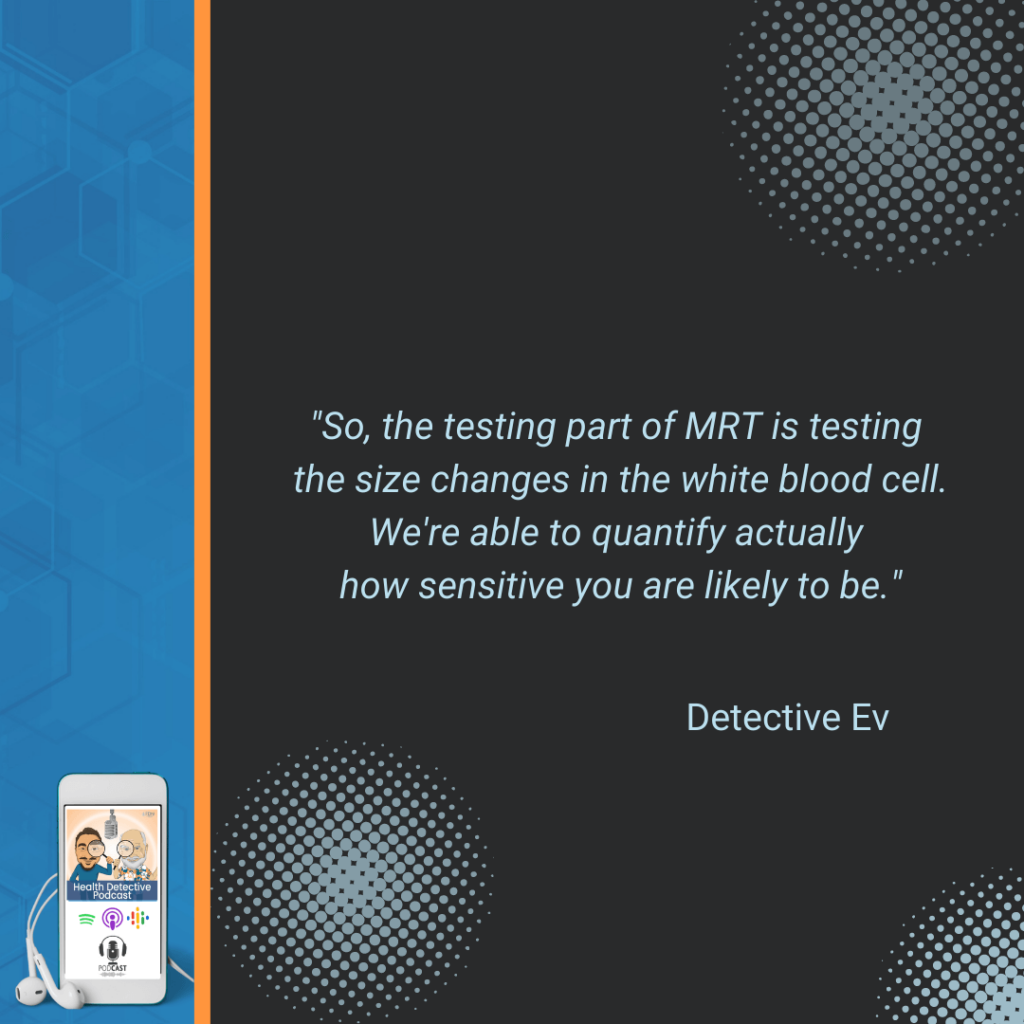
When they release it, they look for how much the white blood cell changes in size. As it turns out, a lot of the mediators actually get released from the white blood cell. So, the testing part of MRT is testing the size changes in the white blood cell. We’re able to quantify actually how sensitive you are likely to be. As you can imagine, if someone comes up with this type of technology and patents it, it’s a pretty brilliant idea. But you can already kind of see some issues with this initially.
The first initial issue that I see is we don’t know how much size change is relevant. I mean, think about this. If this is your first time doing this test and you just say, oh my gosh, we exposed Johnny’s white blood cell to gluten, and it changed 50% in size. Well, that doesn’t mean anything yet, right? We don’t have anything to compare it to.
Differentiating Gluten Issues: Excellent Replicability Rate
So, we have to ask, what is the symptomology of Johnny? Does he have anything going on? Does he notice something when he removes gluten, when we measure in this fashion, and we find that the white blood cell changed 50% in size? I hope this makes sense. What I’m saying is, since we’re not measuring anything specifically, we’re just measuring the size changes of the white blood cell.
The white blood cell is always going to change in size to some degree. It’s not going to really stay stagnant. Something’s going to get released. And so, it’s hard to tell what size change is actually useful and applicable clinically when we don’t have anything to compare it to. So, over time, this technology gets better and better.

And now the company is proud to be able to say they have a 93.6% replicability rate. Which if you compare that to other food sensitivity tests, let’s just put it this way, there’s not many out there that post the replicability rate of their test. And there is a reason for that. It is because it is not near 94%, I promise you that much. Really good test! Perfect? No. Getting better over time? Yes, absolutely.
It’s a test that is highly correlated with the symptomology of the person. Meaning, that we notice that when people remove these foods, their symptoms do improve, they do feel better. And it is really kind of crazy what can happen with that test. Because we’ll have people come into my practice, for example. We love that test at my practice, we’ll run it.
Differentiating Gluten Issues: The Best Data You Can Get
You know, we ran it for something completely different than what they came in for and they lose 15 pounds. And they’re like, I didn’t change anything. I didn’t change my calories; I didn’t really restrict eating in any way. Actually, I just changed some foods around and stopped eating what I was sensitive to, and I lost 15 pounds in a freaking month. Like how amazing is that? These are people that sometimes come in for skin issues, anxiety, or something completely different.
So, that’s the sensitivity side. There are many different sensitivity tests out there. Personally, if I only had an IgG test, I would still probably do it, especially if I was sick. When we’re sick, we want to get the best data that we can. If you’re not in America, if you’re not in Canada, then you might have to use a different type of test.
We’ll, actually, I teach you about those different types of tests in the course depending on where you’re at in the world. We do have practitioners from all over the world, I think in about, it’s over 50 countries at this point. I’m not sure if it’s hit 60 quite yet. But that’s okay, you can use a different test.
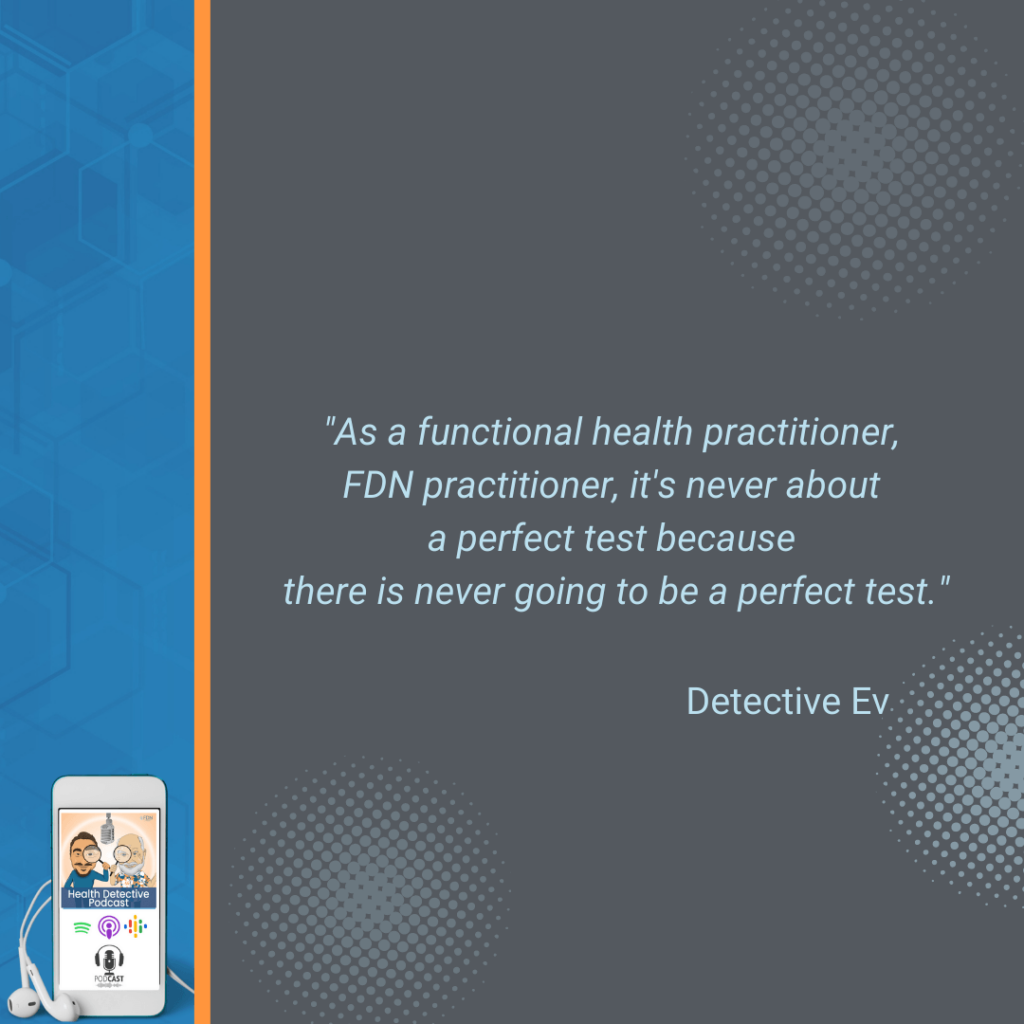
You want to use the best data that you can get at any given time. And that’s a separate note from today, but that’s kind of just a lesson. As a functional health practitioner, FDN practitioner, it’s never about a perfect test because there is never going to be a perfect test. I mean, maybe, who knows? Technology’s going pretty quick, right?
Differentiating Gluten Issues: Applying the Data
But right now, I don’t see any perfect test in the foreseeable future. So, it’s always about being a smart practitioner and knowing what you’re working with and applying the stuff as well as you can based on the data that you’re getting.
We had a stool test prior to the one that we’re using now that eventually became outdated but at one point was the best technology that you could use. And so, we had to adopt that. This one that we have now is probably at least two times or three times better, but we had that other technology in the past, and that’s what it had to be.

So, no matter where you’re at in the world, if you have access to at least some food sensitivity test, you don’t have anything to worry about. You can always do something with the data that comes from it and make your client’s life a lot easier. And probably yours too, cause they’re going to feel better, like you more, and be nicer when they’re not reacting to stuff that they’re eating three to four times a day.
Okay, so that’s sensitivities, any immune reaction, for the most part, that is not an allergy.
Differentiating Gluten Issues: Food Intolerances
Before I get into celiac, I’m actually going to jump into intolerances cause I think it’s more logical to do it that way. A food intolerance, a gluten intolerance does not imply any immune reaction. That’s the key here. A food intolerance does not imply any immune reaction, although something to note is that these two could very well be together sometimes. That is to say that you could have an intolerance while also having an immune reaction. But just having an intolerance does not imply the immune side.

Here’s a basic example of this that every single person listening to this has heard of cause it’s so common, a lactose intolerance. That means the person does not have the proper enzymes to break down lactose. And what do you need for that? You need lactase. This is something that’s very common in pretty much any digestive enzyme that you can go and buy on the market. They provide lactase so that people can better break down lactose.
Now, just because you weren’t able to break down lactose does not mean that your immune system is flaring up and firing from all angles. That doesn’t mean that at all. What it means is that you can’t break it down. And if we have something in our stomach and GI tract that we can’t break down, well, that’s when we become kind of subject to these weird symptoms, uncomfortable symptoms that might happen as a result. You might get the burping, you might get diarrhea, you might get constipation. You might just get a lot of bloating because things aren’t operating well down there.
Differentiating Gluten Issues: Most Don’t Know
We’re not able to break down this food or food protein or whatever it might be. In this case, it’s a sugar, I believe. I should know that. Lactose sounds like a sugar. Let me see. Okay. I just paused and looked it up. And yes, I don’t know why I questioned myself. Lactose is indeed a sugar. So, it could be any way that you can’t break down the stuff, and that leads to the intolerance, right? You’re not able to tolerate it, you have these GI symptoms.
And it is that specific idea that led to the inspiration for this quick podcast, again, because this client the other day had said, they didn’t think that they could be sensitive to gluten because they didn’t have any stomach issues. This person was more amazed by this, it’s not like they were challenging what I was saying, oh, wait, no, I can’t be sensitive. It was more of, oh my gosh, I never knew I could be sensitive if I didn’t have stomach issues.
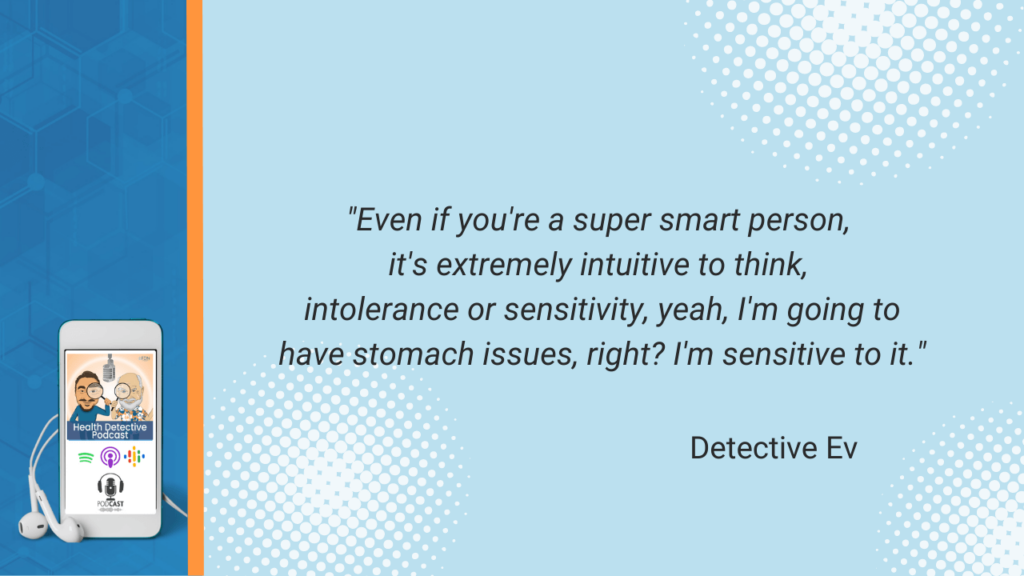
Maybe you are already a health coach, already an FDN practitioner or something similar and you’re like, Ev, I know this. I get this already. Here’s the thing, your clients don’t. The average person doesn’t get this. Even if you’re a super smart person, it’s extremely intuitive to think, intolerance or sensitivity, yeah, I’m going to have stomach issues, right? I’m sensitive to it. I mean, people say this, they have a sensitive stomach. What do they mean? They’re having GI symptoms to whatever they ate. So, they’re going to use these things interchangeably.
Differentiating Gluten Issues: Educating People
And it’s our job, we’ve got to educate these people and let them know what’s going on. This is a great thing to be using as free content on your Instagram or whatever social media platform you use to advertise your business. These little things add up. You’ll get people all the time that reach out because of this, saying, I never knew that.

Then it leads to other great questions of, well, how can I figure out if I’m sensitive or not? Then you’re able to ethically say that the best way is to test. I say ethically because, obviously, it’s to your advantage to utilize lab testing with them cause you’re going to be able to charge a consultation fee but it’s also correct. The best way to know is to test and not guess.
Differentiating Gluten Issues: Celiac Disease
The last thing we wanted to talk about today was celiac disease. This is one that is specific to gluten. Celiac’s, kind of a curve ball, odd thing. It’s an autoimmune condition, a relatively common one at that. And it’s an autoimmune condition that the body does this weird thing where it actually attacks its small intestine when gluten is present. How odd is that?
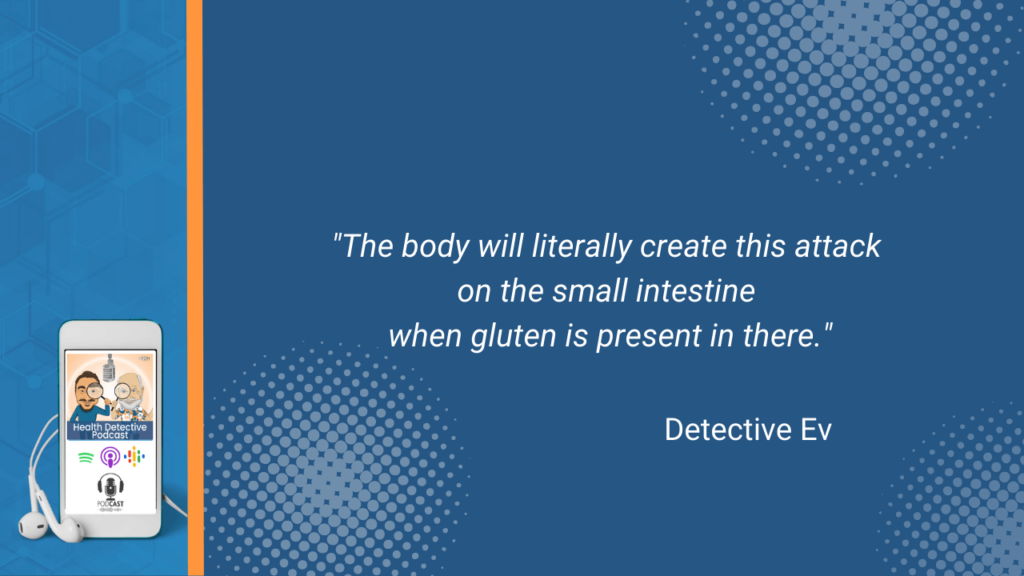
The body will literally create this attack on the small intestine when gluten is present in there. And the issue with that is you kind of need your small intestine to be in good shape. If you just look this up online, even if you look up cartoon leady gut, it’ll come up right up on Google Images and you’ll see what I mean.
You’ll see these almost blob like looking things, they’re trying to represent the cells. And then you’ll see these hair-like things on top of it, that’s the microvilli. What is happening to someone with celiac, and this is actually one of the ways they diagnose it. They’ll use an endoscopy procedure on you, which absolutely sucks.
I had an endoscopy done; I wouldn’t recommend it. Grant you, you do go under for it, but there is something incredibly violating about knowing that someone just shoved a tube down your throat when you were unconscious. And if you’ve had a colonoscopy listening to this and you’re thinking, well, yeah, that endoscopy is nothing. You’ve got to try the colonoscopy. Oh, I did. It was just back-to-back days. So, I did the endoscopy on one day, colonoscopy the next day.
Differentiating Gluten Issues: Blunted Brush Border
This is why I try to stick with the functional side of things, man, and just stay healthy. I like to avoid Western medicine whenever I can. Not that it’s not very useful at certain times, but man, I don’t need tubes going anywhere. That was not a fun experience.

So, one of the ways that they’ll diagnose celiac is by using that endoscopy scope. They’ll go in and see if the microvilli in the small intestine is broken down. Is it atrophied? And when it’s really bad, it’s called a blunted brush border. In some celiac patients, you’ll actually look at this thing and you can see these pictures online. Just look up atrophied microvilli of celiac disease. I’m sure that’ll come up right away. You’ll see that there’s almost no hair like looking things left. It’s beaten down.
Well, we need those microvilli to assimilate nutrients. And one of the interesting things, and maybe interesting’s the wrong word. I’m sure they don’t find it interesting, the people that suffer with this, but humor me for the sake of today’s conversation. The interesting thing that happens here is these people don’t always get diagnosed with celiac. In fact, it takes a really long time for people to get diagnosed with any autoimmune condition in general, let alone something like Celiac.
But they will start getting other diagnoses. These people might be very prone to joint pain. These people might have osteoporosis. A lot of these people will end up developing thyroid autoimmunity, so they might get diagnosed with that first.
Differentiating Gluten Issues: Mental Health Issues
A very common one too that’s very sad is the mental health issues. I had a friend that had celiac disease, but she got admitted into the hospital for very severe mental health symptoms. Well, it turns out when you have a blunted brush border and you’re not assimilating nutrients as well, and you’re eating a standard American diet, you really don’t get much of anything in terms of nutrition. And when you’re malnourished, it’s not actually the best thing for your mental health or the health of your body.
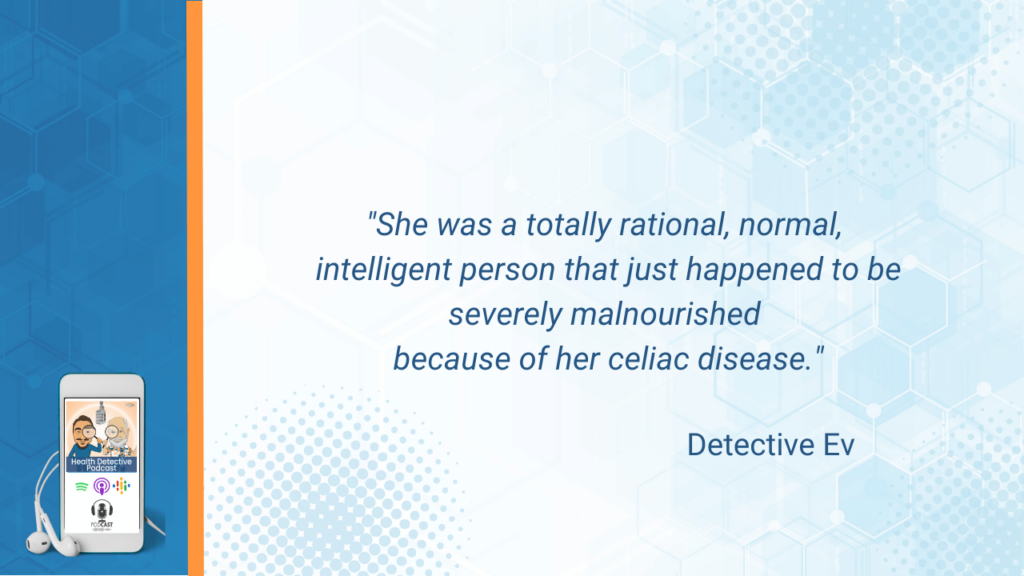
Malnourishment is a really common issue in people with celiac disease. So, she had all this mental health stuff going on, was doing some things that to the outside world would look very far out. She was a totally rational, normal, intelligent person that just happened to be severely malnourished because of her celiac disease.
So, remember, this is the condition that’s unique to the gluten thing. It’s estimated that it’s about one in a hundred people. Some people will argue you one way or the other. I say try to rule it out if you can. I’m sure you don’t want to do an endoscopy, but if you have a sensitivity, if you have an intolerance, if you have an allergy, treat it like celiac. Act like the celiac people do.
Differentiating Gluten Issues: A Tiny Bit Lasts a Long Time
Because the people with sensitivities, all of a sudden, they think it’s not a big deal. They think that they can eat this every now and then. And they don’t realize that there’s research showing that the immune reactions that are caused by consuming gluten, if you have some of these conditions like celiac or a food sensitivity, your immune response is going to be elevated for up to several months, after ingesting gluten, even if you took the rest of those months completely off from gluten. How crazy is that?

This immune response can last months after just eating a little serving. The actual amount, by the way, is a 10th of the size of your thumbnail. That’s how much gluten it would take to cause this immune response for that long.
And this isn’t to scare anyone or create restrictions around food. But there’s pros and cons to everything and there’s certain times that we need to make tough decisions with certain foods. Gluten’s not one I mess with, not once a month, not once a year. It’s just, it’s gone. Seriously, it’s out of my vocabulary, except for stuff like this. I’m not going to have that in my body and in my life because the cookies aren’t worth it.
And if I really wanted cookies, I can get some great gluten-free cookies that taste just as good half the time. Right? Gluten’s not a particularly hard one to replace. You just have to be willing to spend more on the product. If you’re willing to spend more, it’s very easy to replicate the taste of things that were gluten-based products. That’s the difference.
Differentiating Gluten Issues: Summary
Maybe send this to one of your clients or repurpose this content. I’m not going to get mad. Use this stuff to educate others cause they don’t get how serious this stuff is and they don’t get the difference. They think that because they have a sensitivity, they can do whatever they want. They think that the symptoms of an intolerance are the symptoms that you would have with the sensitivity and don’t realize that those things are not necessarily connected at all.
In summary, this is a quick reminder. Gluten allergy is an IgE response, immunoglobulin E. That’s any food allergy is an immunoglobulin E response. Food sensitivities historically had been IgG, immunoglobulin G, but now it is really more or less a blanket broad term that gets used to describe almost any immune response that is not IgE antibodies.
Intolerances do not imply any immune response. Intolerances simply mean that you can’t tolerate it. A hint for this is always lactose intolerance. Lactose, the sugar, as we discovered, needs to be broken down by the enzyme lactase. In the absence of lactase, you can’t break down lactose and you feel GI symptoms. It does not mean you had an immune response. It means that you can’t digest it properly. That’s an intolerance.
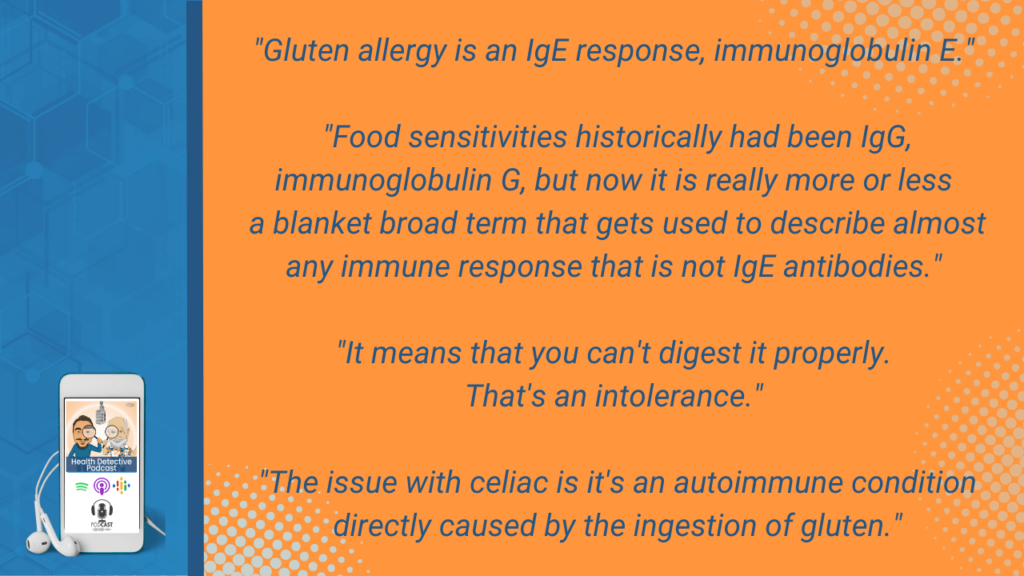
And finally, celiac is something that is exclusive to gluten. The issue with celiac is it’s an autoimmune condition directly caused by the ingestion of gluten. And then it attacks the heck out of your small intestine, which can lead to many issues including but not limited to malnourishment, mental health issues, osteoporosis, hypothyroidism, and any other autoimmune condition.
Conclusion
I hope that this helps. We will be back next time with another interview. But some things have been going on that allowed me for some time to do some solo episodes, and you guys click on these. So, if you don’t want them, you’ve got to stop clicking on them cause it makes me think that you actually like what I’m saying. Okay? And then I’m going to keep doing them.
You guys know where to find us if you ever have questions. You can go to fdntraining on Instagram. We have real humans that answer you there. We have not given up to the AI overlords and we don’t plan on doing that anytime soon. So, that’s at fdntraining on Instagram. DM us, we will have a real human answer you.
They aren’t always the same people that do the podcast, aka I’m not really the one monitoring that all the time. So, make sure you let them know that you heard it from the podcast so that they know what the heck you’re talking about.
I’m looking forward to talking to you guys again soon. But until then, please take care.

You can always visit us at functionaldiagnosticnutrition.com. Our Instagram handle is @fdntraining.
For more informational and functional health-oriented podcasts like this one, go to functionaldiagnosticnutrition.com/health-detective-podcast/.
To learn more about us, go to functionaldiagnosticnutrition.com/about-fdn-functional-testing/.

